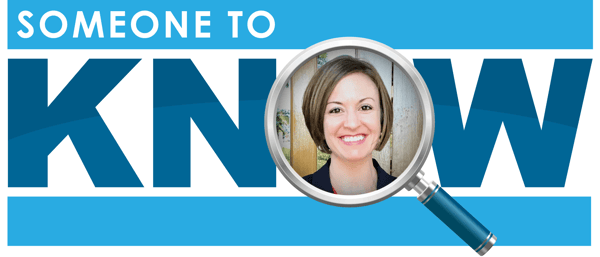Someone to Know: Q&A with AB InBev Global Manager of Internal Communications Megan Booker
What can business and communications learn from dance? Megan Booker is Global Manager of Internal Communications at AB InBev. Prior to joining AB InBev, Megan held a series of communications roles at Kimberly-Clark, and is a recent graduate of Georgetown University’s Executive Master’s in Global Strategic Communication. When she’s not helping shape the internal communication strategy for this global organization, Megan can be found pursuing another passion – dance. And, according to Megan, strategic communications and dance have a few things in common – I’ll let her tell you more.

Q&A with Megan Booker,
Global Manager of Internal Communications
at AB InBev
Q: How do you describe your role today?
A: My role today is all about connecting the dots. Internal communications is evolving from a function that’s traditionally thought of as building newsletters and dressing up PowerPoint presentations, to a more strategic role. We can add the most value when we’re at the table with the business leaders understanding where we’re trying to go as an organization and carving that path together. It’s there where we can put our skills to work in making the connection between where people are today and where we want them to go and build a plan together to bridge that gap.
Q: It's been said that curiosity is one of the most important traits of a great leader. How has being curious helped you be a better leader?
A: Curiosity has been key to my personal and professional growth. Without curiosity, I wouldn’t have taken some of the roles I’ve had so far in my career that have taught me the most. My curiosity has also led me to have conversations with other leaders that I wouldn’t have otherwise had, and I’ve benefited greatly from their wisdom.
Some of the best career advice I’ve received was when a leader, whom I still admire and respect, encouraged me to ask any question as long as it came from a place of authenticity. I’ve found the best way to discover what you don’t yet know is to not be afraid to ask questions, and never pass up an opportunity to ask other leaders about their experiences. Hearing others’ experiences helps me look at things in new and different ways and helps me keep an open mind.
Q: What advice do you have for organizations trying to improve their performance?
A: Organizational performance comes down to people, and companies can learn a lot from other performers. For example, dancers learn focus, discipline and perseverance early on. They show up to class each day to learn and execute skills they’ve been building for years, and then combine those skills in new and different ways often outside of their comfort zone. Dance is a sport where you spend a lot of time looking inwardly and applying new skills and feedback to continuously improve. Organizations need to do the same.
Looking in the mirror is something that is key to leadership, and leadership is key to improving organizational performance. It takes courage to show up, to see and be seen, and to listen for what’s not being said. Great leaders make great teams, and with great teams, anything is possible.
Q: I know you’re passionate about your career and dance and we’ve spoken about the interesting connection between the two. What parallels do you draw between strategic communications and dance?
A: My role as a communicator is a lot like the role of a choreographer. There’s a story you want to tell through people to move an audience. To do that, you have to understand where the audience is today, where you want to take them, and how to get from point A to point B.
Bring your audience with you. Communications today is not about what the team can do for an organization—communication is really everyone’s job. Communication professionals wear many hats. Sometimes, we’re the provocateur, sometimes we’re the teacher, and other times we’re the connector. We need to know which hat to wear in which situation, and that is critical to helping bring leaders along the journey to communicating well. For me, this is similar to characters in a dance routine—the performer embodies a certain character and takes the audience on a journey.
Improvise. As much as I like to have a plan, sometimes the best thing you can do is show up and improvise. Especially in a crisis situation, it’s easy to get caught up in following the rule book, and sometimes we forget to be human. Improvisation in dance can be a beautiful and magical thing as long as you really listen and bring your whole self to the table—the same can be said for communication professionals.
Take risks. In communication, we often think we need to play it safe so as not to provoke, and I think the opposite is true. In dance we call this ‘abandonment,’ and you recognize it because that’s when it starts to break through. If we’re not taking risks and provoking, then we’re not doing our job.
Q: What's one communications prediction you have for 2018?
Data will remain king. It’s critical that we align our work with business priorities and measure the impact of our work.
Q: What tried and true strategies do you count on to help leaders understand the value of communications?
Show up, and give more than expected. Learn the business. Read the news. Connect the dots, and continue to lead the conversation with leaders to help them see what’s possible.
Q: Who in business do you most admire today and why?
I admire men and women in business who use their experience to help develop others. We live in a competitive world, and while a certain level of competition is healthy and helps us grow, I admire those who help others realize their potential. I've had the opportunity to work with and learn from amazing leaders who help guide and mentor those who show up and put in the work. It takes a certain amount of courage and confidence to do that, and those are the leaders I admire most.
Q: Any other words of wisdom for communications teams who want to be even better?
Listen first. Keep learning. Lean on each other for help—most of us are trying to solve many of the same challenges—let’s offer each other a hand!
----
 Megan Booker is currently Global Manager, Internal Communications at AB InBev in New York. Prior to joining InBev, Megan was a Senior Communications Consultant at Kimberly-Clark. She is a self-starter with a passion for delivering business value through communication. Megan holds a bachelor’s degree in Psychology and Philosophy from the University of Tennessee, an MBA from King University, and an Executive Master’s in Global Strategic Communication from Georgetown University.
Megan Booker is currently Global Manager, Internal Communications at AB InBev in New York. Prior to joining InBev, Megan was a Senior Communications Consultant at Kimberly-Clark. She is a self-starter with a passion for delivering business value through communication. Megan holds a bachelor’s degree in Psychology and Philosophy from the University of Tennessee, an MBA from King University, and an Executive Master’s in Global Strategic Communication from Georgetown University.
To read more executive Q&As in our Someone to Know Series, click here.
Click below to download the eBook—Going Slow to Go Fast: Making Internal Communication Work for You—a go-to resource for communicators who want to build an internal communication plan that speaks directly to the number-one question on business leaders’ minds: How will this improve our bottom line?

Comments on this post